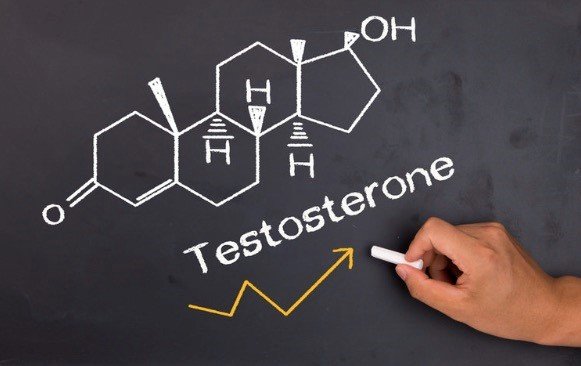Intermittent Fasting and Testosterone: An Introduction
Intermittent fasting has gained significant traction in the health and wellness community due to its numerous benefits. Fitness and nutrition experts praise it for promoting weight loss and enhancing metabolic health.
Fasting is an essential part of my overall fitness program. As I write this at 2 p.m. on a Wednesday, I have yet to have my first meal of the day. Whenever I need to achieve a calorie deficit to create a more shredded and leaner look, intermittent fasting is my go-to diet strategy.
However, many men are unaware that fasting can also assist in boosting testosterone levels. In this article, we will explore the connection between intermittent fasting and testosterone. We’ll examine how fasting influences hormonal health, its potential benefits, and risks, and provide practical tips for those looking to use fasting to naturally boost their testosterone levels.
Whether you’re new to fasting or seeking to understand its impact on hormones, this guide will help you make an informed choice about incorporating intermittent fasting into your fitness routine..
What is Testosterone, and Why Is It Important?
Testosterone is a steroid hormone primarily produced in men’s testicles and, in smaller amounts, in women’s ovaries.
It also significantly increases muscle and bone mass. Additionally, testosterone is vital for overall health and well-being, influencing mood, energy levels, and cognitive functions. It plays an important role in developing reproductive tissues and promoting characteristics such as body hair growth and voice deepening.

How Does It Work & What Are The Effects of Intermittent Fasting?
Intermittent Fasting is a dietary approach that switches between periods of eating and not eating. Unlike other diet types that focus on what you eat, fasting focuses on when you eat. This eating pattern is designed to take advantage of the body’s metabolic processes to potentially enhance health and well-being.
Intermittent Fasting works by extending the periods when your body has burned through the calories consumed from your last meal and then begins to tap into fat reserves for energy. During fasting, insulin levels drop, promoting fat burning and various other health benefits. Although it might sound complicated, it’s a simple concept: you designate a specific time window for eating and another for fasting.
The Relationship Between Intermittent Fasting and Testosterone
Exploring the connection between fasting and testosterone involves understanding how fasting impacts various hormonal processes in the body. Fasting can potentially influence testosterone through several mechanisms:
How Does Fasting Increase Testosterone?
- Growth Hormone Secretion: Intermittent fasting may boost human growth hormone (HGH) levels, which play a significant role in muscle growth and fat metabolism. Higher HGH levels during fasting can indirectly support increased testosterone production.
- Insulin Sensitivity and Fat Loss: Fasting improves insulin sensitivity and promotes fat loss. Lower body fat is often linked to higher testosterone, and better insulin sensitivity helps maintain a balanced hormonal environment.
- Reduction in Cortisol Levels: Cortisol, known as the stress hormone, can negatively affect testosterone production. Intermittent fasting has been shown to reduce baseline cortisol levels, which can help sustain higher testosterone.
- Leptin and Ghrelin Regulation: Fasting influences the regulation of hunger hormones like leptin and ghrelin. These hormones not only control appetite but also interact with pathways that affect testosterone production. Proper regulation of leptin and ghrelin can create a favorable environment for maintaining optimal testosterone levels.
Understanding these concepts can assist you in making better decisions about integrating intermittent fasting into your lifestyle to potentially boost testosterone and overall health.
Step-by-Step Guide to Safely Starting Intermittent Fasting
Starting intermittent fasting can be a game-changer for your health, but doing it safely and effectively is important. Here’s a step-by-step guide to help you ease into this eating pattern and maximize its benefits.

- Choose a Plan: Select a fasting method that fits your lifestyle, such as the 16/8 method, the 5:2 diet, or the Eat-Stop-Eat approach. Each plan has its own structure and flexibility, so find one you can comfortably integrate into your daily routine.
- Gradual Introduction: Ease into intermittent fasting by starting with shorter fasting periods. Gradually increase the fasting duration as your body adapts to the new eating schedule. This gradual approach helps minimize discomfort and increases your chances of long-term success.
- Stay Hydrated: Hydration is crucial while fasting. Drink plenty of water and include non-caloric beverages like herbal tea or black coffee to stay hydrated and support metabolic functions.
- Balance Nutrition: During your eating window, focus on nutrient-rich foods to ensure you get the necessary vitamins and minerals. Incorporate a variety of vegetables, healthy fats, whole grains, and lean proteins to maintain your overall health and hormonal balance.
By understanding the principles of fasting and tailoring the approach to your individual needs, you can effectively incorporate this powerful eating pattern into your lifestyle for enhanced health and well-being.
Diet Strategies: What Should I Eat When Fasting to Increase Testosterone?
Optimizing your diet while practicing intermittent fasting can significantly boost your testosterone. Here’s what you should focus on:

- Healthy Fats: Include healthy fats in your regular diet, such as seeds, avocados, nuts, and olive oil. These fats are essential for hormone synthesis, including testosterone.
- Lean Proteins: Ensure you’re getting enough protein from sources like chicken, fish, eggs, and plant-based options. Protein facilitates muscle repair and growth, which is essential for maintaining high testosterone.
- Micronutrients: Eat foods rich in vitamins and minerals, especially zinc (found in meats, shellfish, and legumes) and magnesium (found in leafy greens, nuts, and seeds). These nutrients play an important role in supporting testosterone production.
For more information on the best protein sources, check out our top protein sources for muscle growth and testosterone.
Common Fasting Mistakes That Can Lead to Low Testosterone
Intermittent fasting can be incredibly effective, but it’s easy to stumble if you’re not mindful of some common pitfalls that could lead to lower testosterone. Here’s a quick guide to help you avoid the most frequent mistakes and keep your fasting journey on track.
- Skipping Nutrients: Just because you’re eating in a limited window doesn’t mean you should neglect nutrient-dense foods. Ensure your meals are well balanced and packed with vitamins and minerals to promote your overall health and hormonal balance.
- Overeating: It’s tempting to overeat when your eating window opens, but this can negate the benefits of fasting and lead to weight gain and digestive issues. Aim for moderate, well-portioned meals.
- Ignoring Hydration: Don’t forget to drink water! Staying hydrated is crucial, especially during fasting periods, to keep your body functioning optimally.
- Lack of Consistency: Inconsistency can confuse your body and disrupt your progress. Stick to a regular fasting schedule for a few weeks to truly gauge its effectiveness.
For additional tips on avoiding common pitfalls, visit our blog on building muscle while losing fat.
Best Practices for Monitoring Hormone Levels
Keeping track of your hormone levels is key to understanding your overall health and the effectiveness of your diet and lifestyle strategies. Here are some best practices:
- Baseline Levels: Start by knowing your baseline testosterone levels. This will help you monitor any changes over time and evaluate how well your strategies are working.
- Early Detection: Regular testing can help you identify hormonal imbalances early, allowing for timely interventions and adjustments to your diet or lifestyle.
How Can You Test Your Testosterone Levels?
When it comes to testing your testosterone and hormone levels, there are a few methods you can use:
- Blood Tests: The most common and accurate way to measure testosterone levels. Schedule these with your healthcare provider.
- Saliva Tests: These are convenient and can be done at home, and saliva tests measure free testosterone levels.
- Urine Tests: These can be done at home or provided by a doctor. Urine tests offer a comprehensive hormone panel, including testosterone and other hormones like cortisol, and estrogen.
What Are Normal Men’s Testosterone Levels by Age Group?
Understanding how testosterone levels change with age can help you maintain your optimal health and address any potential issues early on. Here’s a quick look at what’s considered normal for different age groups.
- Young Adults (20-30 years): Typically, testosterone levels peak during this age range, averaging around 300-1,000 ng/dL. This is when men generally experience their highest energy, muscle mass, and libido levels.
- Middle Age (40-50 years): As men enter middle age, testosterone levels may begin to decline, generally remaining within the 300-800 ng/dL range. You might notice subtle changes in energy levels, muscle mass, and mood during this period.
- Older Adults (60+ years): Testosterone levels can decrease further, often ranging between 200-600 ng/dL. Health and lifestyle factors, such as exercise, diet, and stress management, should be considered.
For more information on maintaining high testosterone levels as you age, read our guide on 5 Best Lifestyle Hacks for Higher Testosterone.
How The Fasting – Testosterone Combo Enhances Lean Muscle Growth
Fasting and increased testosterone can significantly boost lean muscle growth and improve workout performance. Combining fasting with an intense HIIT workout is my cheat code whenever I want to shred and get leaner without sacrificing too much muscle. Check out this article for HIIT workout ideas: HIIT Workouts for Lean Muscle: 7 Benefits You Didn’t Know.

Here’s how fasting and the resulting increased testosterone can work together to benefit your fitness goals:
- Calorie Deficit and Fat Loss: Fasting helps create a calorie deficit by restricting eating windows, making it easier to manage calorie intake. A calorie deficit is very important for losing fat while preserving lean muscle mass. Lower body fat enhances muscle definition and is often linked to higher testosterone , which support muscle growth and overall health.
- Increased Human Growth Hormone (HGH): Fasting increases the secretion of human growth hormone (HGH), vital for muscle growth and fat metabolism. Elevated HGH levels enhance muscle recovery and growth, especially when combined with strength training. HGH also plays a role in improving workout performance and overall physical health.
- Enhanced Insulin Sensitivity: Fasting improves insulin sensitivity, allowing better nutrient absorption and muscle growth. Enhanced insulin sensitivity means more efficient transport of glucose and amino acids into muscle cells, driving workout performance and aiding in muscle repair and growth. This efficiency is crucial when eating windows and ensuring that nutrient intake is maximized.
- Testosterone and Muscle Protein Synthesis: Testosterone is essential for muscle protein synthesis, which repairs and builds muscle tissue after exercise. Higher testosterone enhances muscle growth, increase strength, and improve workout performance. Fasting helps maintain and potentially increase testosterone by reducing body fat, lowering cortisol levels, and optimizing hormonal balance.
- Improved Workout Performance: Fasting can improve mental clarity and focus, which benefits workout performance. Fasting can lead to more effective muscle-building sessions and better overall fitness outcomes when combined with the hormonal benefits of increased testosterone and HGH.

- Timing of Nutrient Intake: Strategically timing nutrient intake during eating windows optimizes muscle growth and recovery. Consuming protein-rich meals after workouts takes advantage of the heightened anabolic state, promoting muscle repair and growth. Combining intermittent fasting with a focus on nutrient dense foods help to ensure your body gets the nutrients it needs for muscle synthesis and overall health.
Check out Easy Meal Prep for Busy Men for more insights on combining muscle-building with effective meal prep.
Practical Tips for Combining Fasting and Muscle Building

- Plan Your Fasting Schedule Around Workouts: Align your eating windows with workout times to maximize energy levels and nutrient intake post-exercise.
- Stay Hydrated: Drink plenty of water throughout fasting to support metabolism and muscle function.
- Prioritize Protein: Include high-quality protein sources in your meals to support muscle repair and growth.
- Monitor Progress: Track your body composition and strength gains to adjust your fasting and workout routine as needed.
By integrating fasting with strategies to maintain optimal testosterone levels, you can effectively build lean muscle and enhance workout performance, leading to a fitter, stronger, and healthier body.
The Bottom Line: Will Fasting Increase Testosterone Levels?
Intermittent fasting has the potential to boost testosterone and offers various health benefits. By understanding how fasting impacts hormonal balance, staying informed through research, and applying practical tips, even beyond impacting testosterone men can use intermittent fasting to enhance their overall health and well-being.
Final Thoughts on the Potential of Intermittent Fasting to Boost Testosterone Levels
Fasting can be a powerful tool for increasing testosterone and improving overall health, but it’s important to approach it thoughtfully. Ensure you get proper nutrients during eating windows, avoid extreme fasting practices, and listen to your body’s signals to maintain balance and achieve the best results.
If you’re considering fasting to boost testosterone, consult healthcare professionals to create a plan tailored to your needs. Combining fasting with quality sleep, stress reduction, and regular exercise can promote a healthier, more vibrant life.
By aligning your fasting practices with your body’s needs and maintaining a balanced approach, you can harness the benefits of fasting to maintain optimal testosterone and overall hormonal health.
Frequently Asked Questions
What are the most common methods of intermittent fasting? The most popular methods include:
- 16/8 Method: Fasting for 16 hours and then eating within an 8-hour time window.
- 5:2 Diet: Eating normally for five days and then reducing calorie intake for two days.
- Eat-Stop-Eat: 24-hour fasts once or twice a week.
- Alternate-Day Fasting: Alternating between normal eating days and fasting days.
Each method offers flexibility to fit different lifestyles and goals.
How does short-term fasting differ from long-term fasting in terms of the impact on testosterone?
- Short-term fasting can lead to immediate hormonal shifts, including temporary spikes in testosterone, but the effects may be fleeting without consistent practice.
- Long-term fasting helps stabilize and optimize hormonal functions, maintaining healthy testosterone levels through improved body composition and metabolic rate.
What dietary strategies should I follow when fasting to maximize testosterone? Focus on consuming:
- Healthy Fats: Avocados, nuts, seeds, olive oil.
- Lean Proteins: Chicken, fish, eggs.
- Micronutrients: Zinc from meats and legumes, magnesium from leafy greens and nuts.
These nutrients are crucial for hormone synthesis and overall health.
Can supplements be taken while fasting, and which are beneficial for testosterone? Yes, supplements can be taken while fasting, but be mindful of those that may break your fast. Beneficial supplements for testosterone include:
- Vitamin D: Supports higher testosterone levels.
- Zinc: Essential for testosterone production.
- Magnesium: Regulates testosterone levels and improves sleep quality.
- Omega-3 Fatty Acids: Supports overall hormonal health.
Some supplements may cause digestive issues if taken on an empty stomach. For more on supplements, visit our guide on The Top 5 Supplements for Explosive Muscle Growth.
How does intermittent fasting impact hormonal balance, particularly testosterone? Fasting can:
- Boost Human Growth Hormone (HGH) Levels: Supporting muscle growth and fat metabolism.
- Improve Insulin Sensitivity: Promoting a balanced hormonal environment.
- Reduce Cortisol Levels: Helping to maintain higher testosterone levels.
- Regulate Hunger Hormones: Proper regulation of leptin and ghrelin supports maintaining optimal testosterone levels.
Can intermittent fasting permanently affect testosterone production? Fasting can influence hormone levels, but these effects are usually reversible. Consistently following a well-balanced fasting regimen can help maintain healthy testosterone levels. However, extreme fasting practices or nutritional deficiencies can negatively impact testosterone production, so finding a sustainable approach is essential.
How long does it take to see an increase in testosterone levels with intermittent fasting? The time frame to increase testosterone can vary based on the individual. Some people may notice improvements within a few weeks, while others might take several months. Factors such as age, overall health, diet, and exercise all influence how quickly you might experience benefits.
Is intermittent fasting good for men’s overall health? Yes, fasting can offer numerous health benefits for men, including:
- Improved metabolic health.
- Better weight management.
- Enhanced hormonal balance.
However, its effectiveness and safety can vary. It is recommended that you consult with your personal doctor or healthcare provider before starting any new dietary regimen.
What are the potential benefits of fasting beyond testosterone levels? Fasting can:
- Reduce Oxidative Stress and Inflammation: Lowering cancer risk and chronic diseases.
- Improve Insulin Sensitivity: Reducing the levels of blood sugar can decrease the risks associated with type 2 diabetes.
- Enhance Cardiovascular Function: Lowering blood pressure and cholesterol levels.
- Aid in Weight Loss: Promoting fat burning and weight management.
- Extend Longevity: Promoting cellular repair processes and reducing the risk of age-related diseases.









